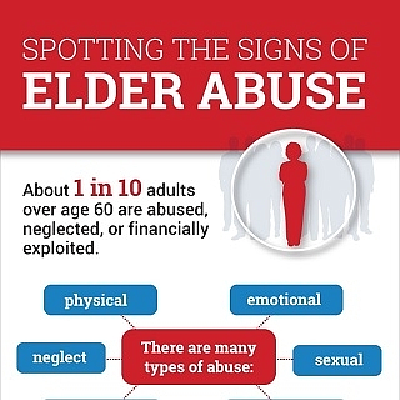Protecting Loved Ones from Elder Abuse
November 20, 2022 at 8:52 a.m.
The pandemic highlighted the disproportionate impact of tragedy on underserved communities, including older adults, who face high rates of elder abuse, fraud, and nursing homes deaths.
It’s important to remember that elder abuse can happen to anyone, regardless of race, ethnicity, gender or financial status. The Social Security Administration is committed to helping and preventing further victimization.
Fraud
A recent Federal Bureau of Investigation report showed that elder fraud has increased. Older adults in the United States reported over $1.6 billion in losses in 2021. This includes victims of COVID-related scams. Older adults in the U.S, also lose nearly 25 times more money to scammers than other groups –an estimated $113.7 billion a year!
Reporting fraud can be difficult and older adults tend to underreport – especially when money is lost. Many older Americans are unsure about the reporting process or feel too embarrassed to report. Understaffed Adult Protective Services offices can also cause long processing times and underreporting.
Learn more about protecting yourself and loved ones at blog.ssa.gov/slam-the-scam-how-to-spot-government-imposters and our Protect Yourself from Social Security Scams webpage at www.ssa.gov/scam.
Abuse
Abuse can happen in many places, including the older person's home, a family member's house, an assisted living facility, or a nursing home. The mistreatment of older adults can be by family members, strangers, health care providers, caregivers, or friends.
Types of abuse
There are many types of abuse:
- Physical abuse happens when someone causes bodily harm by hitting, pushing, or slapping. This may also include restraining an older adult against his/her will, such as locking them in a room or tying them to furniture.
- Emotional abuse, sometimes called psychological abuse, can include a caregiver saying hurtful words, yelling, threatening, or repeatedly ignoring the older adult. Keeping that person from seeing close friends and relatives is another form of emotional abuse.
- Neglect occurs when the caregiver does not try to respond to the older adult's needs. This may include physical, emotional, and social needs, or withholding food, medications, or access to health care.
- Abandonment is leaving an older adult who needs help alone without planning for his or her care.
- Sexual abuse involves a caregiver forcing an older adult to watch or be part of sexual acts.
- Financial abuse happens when money or belongings are stolen from an older adult. It can include forging checks, taking someone else's retirement or Social Security benefits, or using a person's credit cards and bank accounts without their permission. It also includes changing names on a will, bank account, life insurance policy, or title to a house without permission.
What are signs of abuse?
You may see signs of abuse or neglect when you visit an older adult at home or in an eldercare facility. You may notice the person:
- Stops taking part in activities he or she enjoys
- Looks messy, with unwashed hair or dirty clothes
- Has trouble sleeping
- Loses weight for no reason
- Becomes withdrawn or acts agitated or violent
- Displays signs of trauma, like rocking back and forth
- Has unexplained bruises, burns, cuts, or scars
- Has broken eyeglasses/frames, or physical signs of punishment or being restrained
- Develops bed sores or other preventable conditions
- Lacks medical aids (glasses, walker, dentures, hearing aid, medications)
- Has an eviction notice for unpaid rent, notice of late mortgage, or home eviction
- Has hazardous, unsafe, or unclean living conditions
- Displays signs of insufficient care or unpaid bills despite adequate financial resources
If you see signs of abuse, try talking with the older adult to find out what's going on. For instance, the abuse may be from another resident and not from someone who works at the nursing home or assisted living facility. Most importantly, get help or report what you see to adult protective services. You do not need to prove that abuse is occurring. Professionals will investigate.
Who can help?
Elder abuse will not stop on its own. Someone else needs to step in and help. Many older adults are too ashamed to report mistreatment. Or, they're afraid if they make a report it will get back to the abuser and make the situation worse.
If you think someone you know is being abused — physically, emotionally, or financially — talk with him or her when the two of you are alone. You could say you think something is wrong and you're worried. Offer to take him or her to get help, for instance, at a local adult protective services agency.
Many local, state, and national social service agencies can help with emotional, legal, and financial abuse.
The Administration for Community Living has a National Center on Elder Abuse where you can learn about how to report abuse, where to get help, and state laws that deal with abuse and neglect. Go to https://ncea.acl.gov for more information. Or, call the Eldercare Locator weekdays at 800-677-1116.
Washington State’s Long-Term Care Ombudsman Program uses trained volunteers to protect, promote and advocate for residents of adult family homes, nursing homes and assisted living communities. Advocacy for Long-Term Care Residents | Federal Way, WA | Washington State Long-Term Care Ombudsman Program (waombudsman.org)
Most states require that doctors and lawyers report elder mistreatment. Family and friends can also report it. Do not wait. Help is available.
If you think someone is in urgent danger, call 911 or your local police to get help right away.





